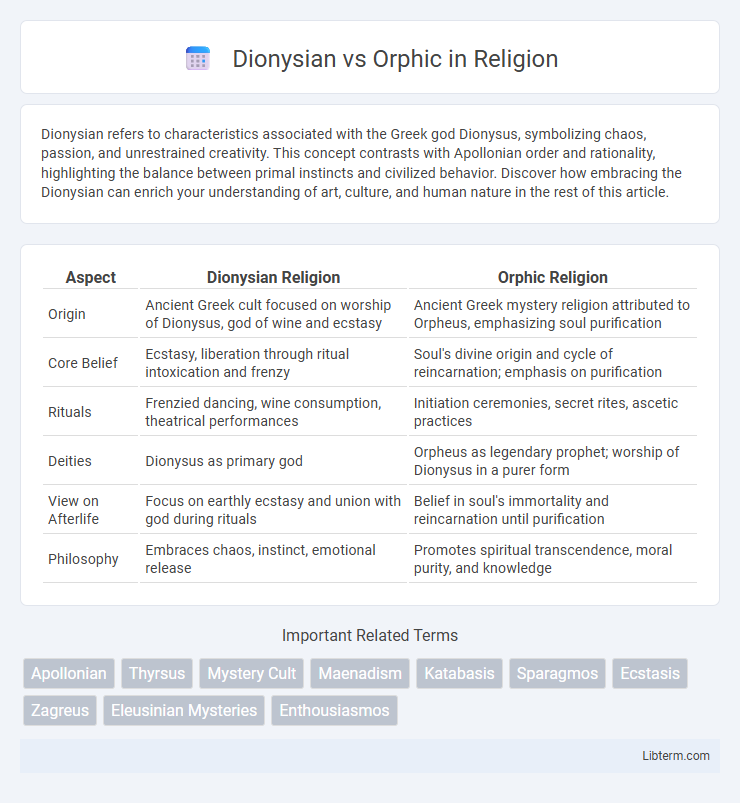Dionysian refers to characteristics associated with the Greek god Dionysus, symbolizing chaos, passion, and unrestrained creativity. This concept contrasts with Apollonian order and rationality, highlighting the balance between primal instincts and civilized behavior. Discover how embracing the Dionysian can enrich your understanding of art, culture, and human nature in the rest of this article.
Table of Comparison
| Aspect | Dionysian Religion | Orphic Religion |
|---|---|---|
| Origin | Ancient Greek cult focused on worship of Dionysus, god of wine and ecstasy | Ancient Greek mystery religion attributed to Orpheus, emphasizing soul purification |
| Core Belief | Ecstasy, liberation through ritual intoxication and frenzy | Soul's divine origin and cycle of reincarnation; emphasis on purification |
| Rituals | Frenzied dancing, wine consumption, theatrical performances | Initiation ceremonies, secret rites, ascetic practices |
| Deities | Dionysus as primary god | Orpheus as legendary prophet; worship of Dionysus in a purer form |
| View on Afterlife | Focus on earthly ecstasy and union with god during rituals | Belief in soul's immortality and reincarnation until purification |
| Philosophy | Embraces chaos, instinct, emotional release | Promotes spiritual transcendence, moral purity, and knowledge |
Introduction to Dionysian and Orphic Traditions
The Dionysian tradition centers on the worship of Dionysus, emphasizing ecstatic rituals, liberation through wine and dance, and the celebration of life's irrational and emotional aspects. The Orphic tradition revolves around the teachings attributed to Orpheus, focusing on purification, the soul's immortality, and the quest for divine knowledge through mystic rites and ascetic practices. Both traditions deeply influence ancient Greek religious thought, shaping concepts of the soul, afterlife, and spiritual transcendence.
Historical Origins and Mythological Roots
The Dionysian tradition originates from the ancient Greek god Dionysus, associated with wine, fertility, and ecstatic celebration, emphasizing liberation through sensory experience and communal rites. In contrast, the Orphic tradition traces back to Orpheus, a mythical poet and prophet, focusing on soul purification, cosmic mysteries, and the cycle of reincarnation through ritual purification and philosophy. Both traditions influenced Greek religious practices but diverged in their mythological roots: Dionysian rites embraced chaos and divine madness, while Orphism pursued asceticism and spiritual enlightenment.
Philosophical Foundations: Chaos vs. Order
The Dionysian philosophy centers on chaos, emphasizing primal instincts, emotional liberation, and the dissolution of structured norms as pathways to transcendence and ecstasy. In contrast, the Orphic tradition upholds order through ritual purity, cosmic harmony, and ascetic discipline aimed at achieving spiritual enlightenment and aligning with divine order. These opposing foundations reflect a fundamental tension between embracing the irrational, chaotic forces of existence and adhering to structured, orderly principles governing the cosmos.
Rituals and Practices: Ecstasy vs. Asceticism
Dionysian rituals emphasize ecstatic celebrations, involving music, dance, and wine to induce trance-like states that dissolve individual identity and foster communal unity. Orphic practices prioritize asceticism, including purification rites, fasting, and strict moral codes aimed at spiritual transcendence and the soul's liberation from the cycle of reincarnation. The Dionysian approach centers on sensory ecstasy as a path to divine connection, whereas the Orphic tradition seeks salvation through disciplined self-control and mystical knowledge.
Symbolism and Iconography in Dionysian and Orphic Beliefs
Dionysian symbolism centers on the vine, ivy, thyrsus staff, and wild animals like leopards representing ecstasy, fertility, and the blurring of human and divine boundaries, while its iconography emphasizes ritual frenzy and the transformative power of wine. Orphic symbolism uses the serpent, gold tablets, and cosmic egg to denote soul purification, rebirth, and the cyclical nature of life and death, reflecting a more introspective and esoteric spiritual path. The iconography in Orphism often includes mystical imagery tied to initiation rites, emphasizing the soul's journey towards liberation and divine knowledge.
Views on the Soul and Afterlife
Dionysian beliefs emphasize the soul's liberation through ecstatic rituals, portraying the afterlife as a continuation of sensory pleasures and communal celebration. Orphic traditions advocate for the soul's purification, viewing it as trapped in a cycle of reincarnation that can only be broken through ritual purity and ascetic practices. These contrasting views highlight Dionysian spirituality's focus on immediate transformation, while Orphism centers on long-term spiritual salvation.
Influence on Ancient Greek Society and Culture
Dionysian influence permeated ancient Greek society through its emphasis on ecstatic rituals, theater, and wine festivals, fostering communal unity and creative expression. Orphic traditions introduced esoteric beliefs about the soul's immortality and purification, shaping Greek religious thought and practices around death and the afterlife. Both shaped philosophical and cultural developments, with Dionysian worship inspiring dramatic arts and Orphism contributing to mysticism and ethical doctrines.
Key Texts and Literary Mentions
The Dionysian tradition is vividly depicted in Euripides' play "The Bacchae," which explores themes of divine ecstasy, chaos, and liberation linked to Dionysus worship. Orphic texts, including the "Orphic Hymns" and the "Derveni Papyrus," emphasize the soul's immortality, purification rituals, and cosmogonic myths associated with Orpheus. These foundational works highlight contrasting spiritual philosophies: Dionysian rites celebrate ecstatic abandon, while Orphic literature underscores structured mysticism and ethical purification.
Lasting Impact on Art, Philosophy, and Religion
The Dionysian influence persists in art through its emphasis on chaos, ecstasy, and the primal instincts, inspiring expressionist movements and theatrical performances that celebrate emotional liberation. Orphic traditions contribute to philosophy and religion by introducing themes of the soul's immortality and purification, which impact Pythagorean mysticism and later Platonic thought. Both streams have profoundly shaped Western cultural frameworks, with Dionysian elements driving experiential and ritualistic practices while Orphic ideas underpin metaphysical and ethical contemplations.
Conclusion: Legacy of Dionysian and Orphic Duality
The Dionysian and Orphic duality profoundly influenced ancient Greek religious thought, blending ecstatic celebration with mystical introspection. This legacy persists in modern spiritual and philosophical discourses, emphasizing the balance between chaotic creativity and disciplined transcendence. The enduring impact of Dionysian frenzy and Orphic purity highlights the human quest for harmony between opposing forces within the psyche.
Dionysian Infographic

 libterm.com
libterm.com